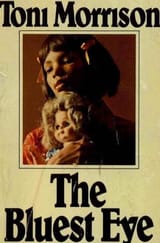>>24701391 (OP)
GROSS: Toni Morrison, welcome back to FRESH AIR. I'd like to start by asking you to do a reading from your new novel. So this is from very early in the novel where Sweetness, the mother who is light-skinned African-American, is talking about how shocking and upsetting it was to give birth to a daughter with very dark skin - as she describes it, midnight black, Sudanese black. So would you pick up from there with the reading?
TONI MORRISON: Sure. (Reading) I hate to say it, but from the very beginning in the maternity ward, the baby, Lula Ann, embarrassed me. Her birth skin was pale, like all babies', even African ones, but it changed fast. I thought I was going crazy when she turned blue-black right before my eyes. I know I went crazy for a minute because once, just for a few seconds, I held a blanket over her face and pressed. But I couldn't do that no matter how much I wished she hadn't been born with that terrible color. I even thought of giving her away to an orphanage someplace, and I was scared to be one of those mothers who put their babies on church steps. Recently, I heard about a couple in Germany, white as snow, who had a dark-skinned baby nobody could explain. Twins, I believe - one white, one colored - but I don't know if it's true. All I know is that for me, nursing her was like having a pickaninny sucking my teat. I went to bottle-feeding soon as I got home. My husband, Louis, is a porter. And when he got back off the rails, he looked at me like I was really crazy and looked at her like she was from the planet Jupiter. He wasn't a cussing man, so when he said, goddamn, what the hell is this, I knew we were in trouble. That's what did it, what caused the fights between me and him. It broke our marriage to pieces. We had three good years together. But when she was born, he blamed me and treated Lula Ann like she was a stranger - more than that, an enemy. He never touched her. I never did convince him that I ain't never, ever fooled around with another man. He was dead sure I was lying. We argued and argued till I told him her blackness must be from his own family, not mine.
GROSS: That's Toni Morrison reading from her new novel, "God Help The Child."
So the mother distances herself from the daughter because of the daughter's dark skin. The father leaves thinking this child must not be his because he, too, is lighter-skinned. And that sets the whole story in motion. And I'm wondering why you chose color, you know, the level of blackness, as a central part of a story.
MORRISON: Well, I wanted to separate color from race. Distinguishing color - light, black, in-between - as the marker for race is really an error. It's socially constructed. It's culturally enforced. And it has some advantages for certain people, but this is really skin privilege. The ranking of color in terms of its closeness to white people or white-skinned people and its devaluation according to how dark one is.



